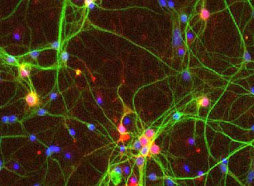
The beginning of a New Year is always filled with new possibilities.... with Hope...
My Christmas wish for everyone out there affected or touched by Huntington's disease is a gift of Hope. Without hope, we would not be waking every morning looking up to a future where this disease will be managed adequately. I personally know that many people, just like me, go to work every day hoping that our efforts will one day bring a cure for those affected by HD. You can rest assured that, as certain as the sun will rise every morning, we will be thinking day and night about you. You are not alone. This is a blog to instill Hope, to let you know we are here with you.
My next entry will be to review a remarkable study funded by CHDI, a non for-profit Foundation aiming to develop drugs for HD. CHDI is funded by an anonymous donor, who invests millions of dollars each year to cure this disease. The study I will review is called TRACK HD, a longitudinal (multi year) study aiming to map out the development of HD. The study tries to follow many people with HD, people who carry the gene but are yet not 'symptomatic' (that is, a neurologist has not yet diagnosed their symptoms as having HD), and control subjects. The study aims to identify the most sensitive 'markers' of disease progression, a step that is necessary to develop drugs for HD, particularly disease-modifying therapies. By understanding the rate of progression, we can one day assess whether early intervention changes the rate of progression (hence 'disease modifying').
The results from the first year of TRACK have recently been published (see Tabrizi et al., Lancet Neurology, 2009). Among the many important findings of this work, two issues stand out: first, people who are carriers, even ten years before the predicted 'onset' of the clinical symptoms, already have significant neuronal degeneration, and perform significantly worse on some tests that unaffected people. Even though this finding might be troubling, it also highlights that, in spite of that damage, people can go about their daily lives largely unaffected, which gives us reason for Hope. The brain can deal with a lot of damage before we succumb to such injuries. This is in itself is a property of the way the brain developed, and is in my opinion a sign that, if we intervene early enough, we might prevent the disease from progressing to a stage where it really affects people's quality of life and ability to function normally.
Second, this type of study was only possible because many people carriers of the HD gene mutation volunteered for the study. Without them, we could not understand how best to identify such disease modifying therapies, given that, most likely, the successful development of such therapies is dependent on accessing early manifest patients. It is well known that even for TRACK, the centers had difficulty in enrolling all the subjects. Other studies had to be abandoned because it was too difficult to enroll patients, particularly in the US (where issues linked to lack of national health plans and insurance discrimination issues might deter people from enrolling). Without all of you who are at risk (or mutation positive) participating in observational trials such as TRACK, we will never be able to understand how the disease progresses. We need your help!
My wish for 2010 is that, with renewed Hope, all of you might consider how you can help us, the scientists and doctors dedicating their lives to finding a cure, your families and caretakers, your friends, sons and daughters who care for you. You can help by being educated about your disease, by being empowered to make a difference in your life. In many ways, the probability that we scientists find a treatment rests on your shoulders: if you get involved, I have no doubt we will find a way to help you. So get involved!
Merry Christmas!


.jpg)
No comments:
Post a Comment